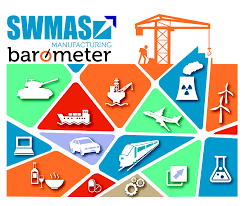Most firms in the South West remain cautious about their prospects as the coronavirus lockdown eases, according to the results of three business surveys released this week – but the region’s small manufacturers appear to be leading the bounce back.
The surveys paint a mixed picture of the outlook over the next few months, with businesses in some sectors such as leisure, sport and travel seeing no improvement while others such as manufacturing and law more upbeat. 
The latest Manufacturing Barometer suggests the sector in the South West is emerging from lockdown after the previous report in April – based on firms’ views as the Covid-19 crisis intensified – showed plummeting sales and production volumes coupled with the probability of deep job cuts.
Three months on, the latest results reveal that while the key indicators remain in negative territory, manufacturers are slightly more optimistic about their prospects over the short and medium term.
However, more than a quarter have already been forced to make redundancies while almost a third expect to make further cuts to their workforce within the next six months.
Key points from Lloyds Bank’s Business Barometer for July show overall confidence among South West firms fell three points in the month to minus 27% while their confidence in their own business prospects was five points lower at minus 25%, compared to June. However, it also picked up signs that staycations are boosting prospects as businesses report increase in demand.
The third survey, released by Nexus Global and gauging the views of managers, shows those in the South West are most assured about demand but least confident about hiring new employees and increasing wages.
The Manufacturing Barometer is the largest survey of its kind in England, received responses from more than 100 small and medium-sized manufacturers South West firms.
Conducted by SWMAS (South West Manufacturing Advisory Service) and the Manufacturing Growth Programme (MGP), the report reveals that 70% of firms have suffered a drop in sales in the past six months, with 42% predicting sales will decrease further between now and the end of the year. 
More encouragingly, 44% expect sales to increase – a massive improvement on the 10% saying this in April.
However, 58% described their business’s current status as ‘surviving’ or ‘recovering’ against 41% saying it is static or growing, with some reporting very little change since the Covid-19 crisis began, while others are now experiencing an increase in demand.
While 80% have made use of the government’s furlough scheme to retain employees, job cuts have been made by more than a quarter and just under a third expect to axe staff within the next six months.
Some 14% have taken additional steps over and above government financial support packages to protect their cashflow with a further 23% saying they will need more financial help.
Thirty-six per cent are predicting their profits to grow within six months – a marked improvement on the 6% saying this in April. However, 41% expect profits to fall further between now and 2021.
SWMAS managing director Nick Golding, pictured above, said: “The survey shows a picture of resilience and innovation from a sector that is doing its best to survive the Covid-19 crisis, but more still needs to be done to get it back on its feet.
“Three quarters have had to review cashflow forecasts to help mitigate the impact of Covid-19, while 22% are also coming under pressure from customers to extend payment terms, further stretching them financially.
“Manufacturers have been busy adapting their businesses as necessary over the past three months; restarting and increasing production, identifying new customers and suppliers, upskilling existing staff, and developing new products and processes in an attempt to overcome current challenges.”
Lloyds’ Business Barometer, which questions 1,200 businesses monthly and provides early signals about UK economic trends both regionally and nationwide, shows 61% of firms suffering a fall in demand for their products and services this month, down two points on June. However, 13% experienced an increase in demand, up eight points. 
Some 62% said they could operate at full capacity while introducing social distancing measures, although just over a fifth fear they could not operate fully within the rules.
Of the 47% that had their supply chain disrupted, 30% expected the situation to improve within three months. Just 2% expect it would take more than 12 months to return to normal levels.
Lloyds Bank Commercial Banking regional director David Beaumont, pictured, said South West businesses still faced critical challenges and issues such as introducing social distancing measures and a lack of demand were weighing heavy on firms’ outlook, making it difficult to sustain last month’s slight rebound in confidence.
“However, with tourism being a key industry for many parts of the South West, the increasing number of firms reporting growing demand could be a sign that the region is beginning to benefit from a rise in staycations,” he added.
The Nexus Global survey shows the South West as among the lowest in the UK for overall confidence with a score of 88.57 out of 190.


















